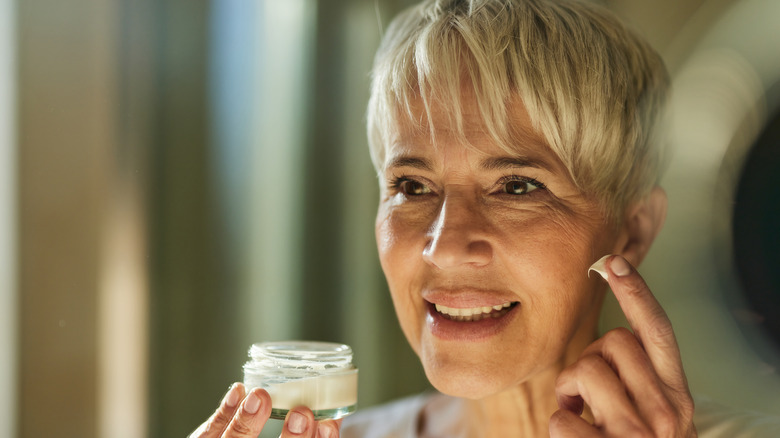The Unusual Health Habit Eva Longoria Swears By To Fight Premature Aging
Director, activist, and actress Eva Longoria, best known for her eight season arc on ABC's "Desperate Housewives," knows the secret to great skin. The biggest skin care mistake most people make, however, is focusing on what goes on top rather than what's underneath. "People think the trick to looking younger is makeup, but it's skin-care," the entrepreneur told Allure back in 2017. To achieve her youthful glow, you might assume Longoria's secret formula involves a lengthy nighttime regimen, but the star keeps things surprisingly simple. Along with regular application of sunscreen, face masks, and different hydrating serums (via Yahoo! Finance), one of Longoria's go-to hacks for fighting off signs of aging is the use of placenta-protein skin creams, reports PopSugar.
The placenta is an organ that forms in the uterus of a pregnant person and serves as a source of oxygen and nutrients for the fetus (via Mayo Clinic). You may have heard a lot of hype around eating placenta after childbirth, as it is purported to potentially boost milk production, protect against postpartum depression, and more. Whether there is scientific merit to these claims remains to be seen, however, as some studies have found no such connection. Rather than ingesting placenta, is it possible that topical application may instead have more credible benefits to offer when it comes to the health of our skin?
Potential benefits of placental extract on wrinkles
The placental extracts used in commercially available skincare creams and lotions are generally derived from animal sources. The extract then undergoes a purification process before being made into a topical product, Dr. Harold Lancer, founder of Lancer Skincare, explained to Byrdie. Sheep are one frequently-used animal source, but researchers from a 2023 study published in the Journal of Medical Internet Research Dermatology alternatively examined whether placental extract from horses had any anti-aging effects on skin.
The study involved 24 women between 37 and 54 years of age who each had varying degrees of wrinkles. A topical anti-wrinkle eye cream containing horse placental extract was administered on one side of each woman's face. After two weeks, notable improvement was seen in wrinkles at the corner of the eye (sometimes referred to as crow's feet) on the side of the face that had been treated with the cream. The researchers attributed this perceived improvement to a decrease in wrinkle width and the total number of wrinkles present.
How plant placenta extract may benefit skin
Instead of animal sources, some companies alternatively use plant placenta extract in their products. Plant placenta has been shown to potentially boost collagen production, firm skin tone, reduce the appearance of wrinkles and redness, brighten skin, and repair damage at a cellular level, reports Yahoo! Life. Physicist Dr. Emilia Karsh told the outlet that her research on plant placenta led her to develop EMK Skin Care, which is said to be Eva Longoria's placenta-protein skin cream of choice.
While placenta skincare products may sound like the magic elixir we've all been waiting for, experts caution that research is still in the early phases and negative reactions could occur if products are not made with high-quality ingredients. "Poorly-manufactured cosmetic products can lead to unwanted irritation, inflammation and lack of efficacy and results," Dr. Lancer told Byrdie, adding that the hormones contained in placenta skincare creams might also pose potential health risks. If you're in search of the Fountain of Youth, Dr. Lancer ultimately suggests erring on the side of caution and reaching for anti-aging products that have been thoroughly researched and backed by dermatologists.



